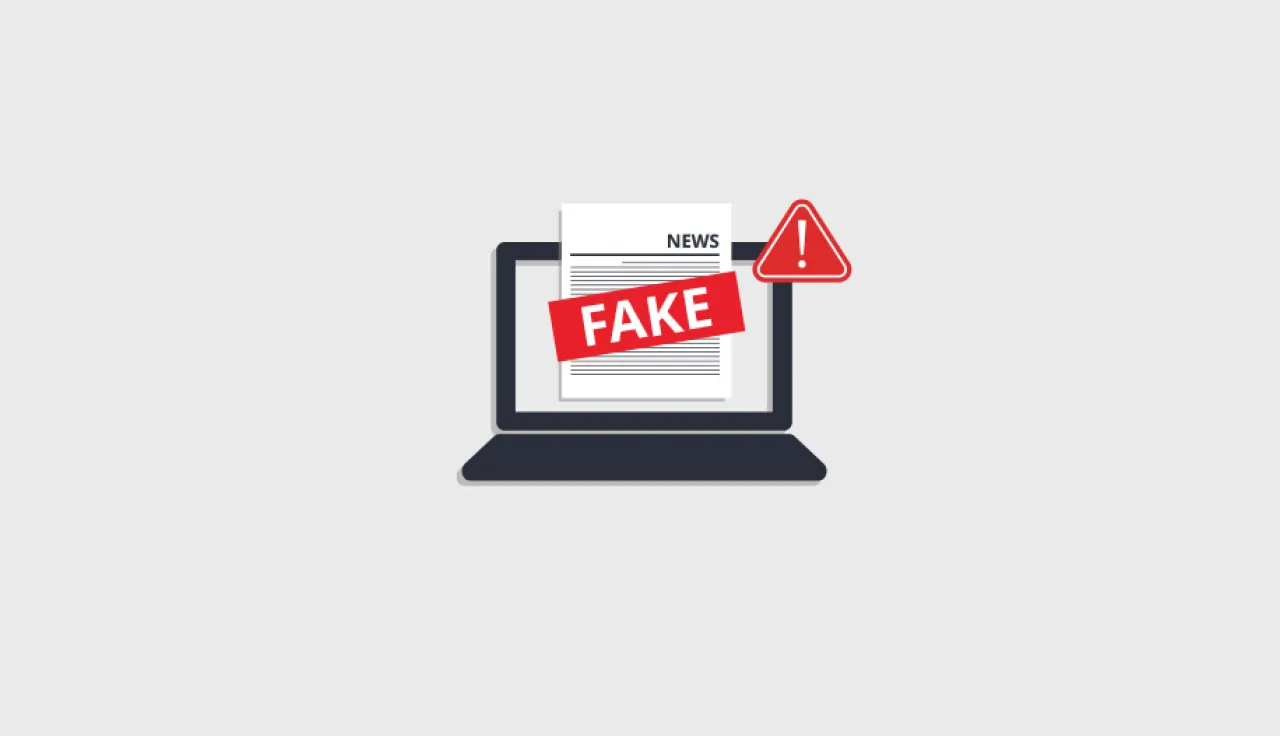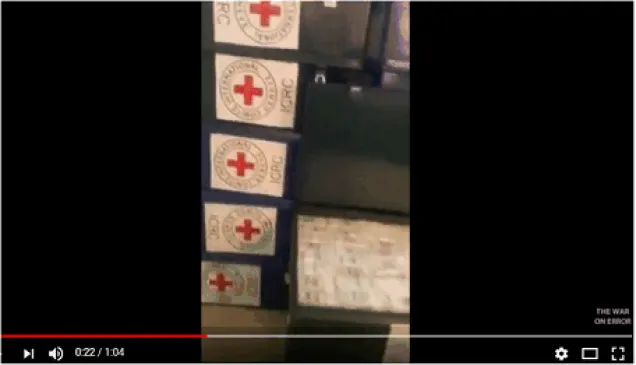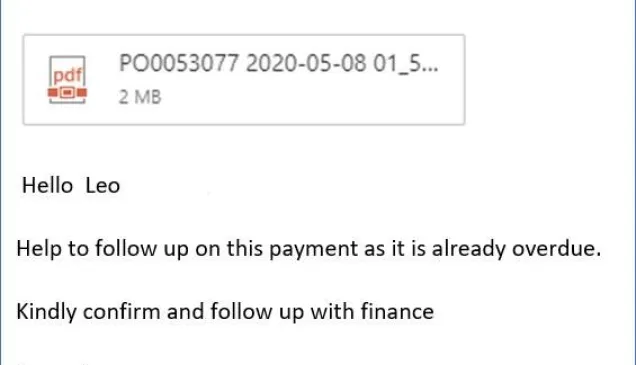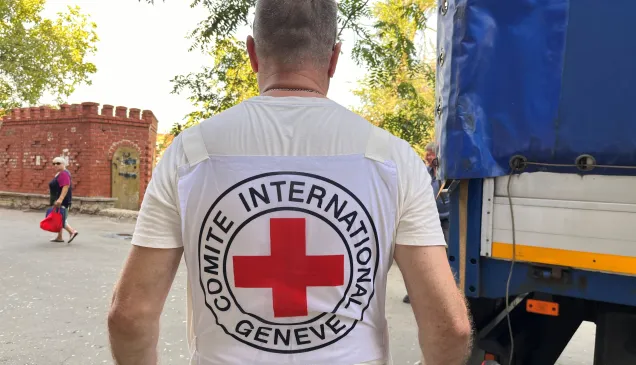Warning: Scams and false claims misusing the ICRC’s name

The International Committee of the Red Cross (ICRC) is aware of fraudulent activities misusing our name, logo, and reputation to deceive individuals and organizations. These scams can take the form of fake humanitarian aid requests, fraudulent job offers, or messages claiming to provide financial assistance in exchange for personal information or payments.
We want to make it clear: The ICRC never requests payments or personal banking details from individuals in exchange for aid, jobs, or other services.
If you receive a suspicious message, email, or request that appears to come from the ICRC but seems unusual or asks for money, please verify its authenticity before taking any action. Below, we share examples of scams we have seen in circulation, to help you recognize them if you should come across something similar in the future.
Examples of attempted scams
-
- "Money transfer" scam
Emails have circulated that appeared to be from our President or from our Director of Communication and Information Management, in which "they" ask the addressee to help them handle a large sum of money originally belonging to someone who has died. This is a fraud.
- False "Money box" claims
There has been a video circulating on social media, raising a lot of speculation and unfounded accusations. The video showing crates with ICRC emblems full of cash is leading to accusations ranging from corruption to laundering of money to aiding terrorists. This is a fabrication with no basis in fact.
Image
- Fraudulent fundraising attempts
A number of fraudulent websites have used the names or emblems of the Red Cross or Red Crescent to solicit donations for the victims of conflict or natural disaster.
Please donate to the Red Cross and Red Crescent Movement through official channels only.
If you wish to donate to the ICRC, please use the authorized channel: https://www.icrc.org/en/donate
- False employment, training or networking opportunities
There have been fraudulent emails in circulation that invite people to pay for fake employment or training opportunities or for attendance at non-existent conferences.
- "Corporate volunteering"/"Christmas lottery" scam
Fake messages have circulated pointing to a page on "ICRC.ORG.UK", a domain we don't control, encouraging ICRC employees to sign up for a "corporate volunteering" program, promising free days and other benefits. No such program exists, and the scam is an attempt to steal employees' private and login data. Some of the pages resemble those on our website, but there are slight differences.
If you receive any unsolicited emails that look suspicious, please treat them with caution. The only source of valid information is the ICRC website, www.icrc.org. In case of doubt, please contact us by email.
- "Property buying" scam
Fake messages have circulated that use the names of at least two members of ICRC staff, saying that they want to purchase property in a range of different countries. Any message like this is a fake and you should delete it.
If you receive any unsolicited emails that look suspicious, please treat them with caution. The only source of valid information is the ICRC website, www.icrc.org. In case of doubt, please contact us.
-
Person claiming to be an ICRC surgeon
A person pretending to be an ICRC doctor working in Syria has recently tricked a member of the public into transferring a large sum of money to a bank account, claiming that fees were due in connection with a cash delivery.
This was a scam. ICRC employees do not move cash around the world by courier, and no ICRC employee would ask someone he had met on Facebook to facilitate a cash transfer. Nor do we have an employee by the name of Melton Corbett. If you are approached by someone who claims to work for the ICRC, asking you to send them money for any reason whatsoever, please contact us.
These photos are in fact of Ukrainian plastic surgeon Dr Vladimir Sazhienko. Dr Sazhienko is not involved in this scam in any way.
The person was using the name of Dr Melton Corbett and the following photos:
Image
- "Money transfer" scam
-
Bogus emails are fraudulent or deceptive emails designed to mislead recipients. They often attempt to steal personal information, spread malware, or scam people. All ICRC email addresses will end in icrc.org or cicr.org.
Examples of fraudulent emails we have seen:
- Bogus emails and requests for money from Dr. Benneth Morrieson are fraudulent.
- Bogus emails purporting to come from "Hugo Blanco, Ghana logistic director of the ICRC" using the email address "hugo.blanco(at)icrcghana(dot)org" are fraudulent.
- Bogus emails purporting to come from Director-General of the ICRC Yves Daccord
- Emails from "Yves Daccord" <teamceooffice20(at)gmail(dot)com>" are not from Yves Daccord.
- Emails coming from Sharesa Spivey "siramsarmull(at)gmail.com" with the subject "ICRC compensation payments to cyber crime victims".
This person pretends to work on behalf of the ICRC, having "recovered millions of dollars and conducting and executing various compensation payments to cyber crime victims from around the world." These emails advise people "to contact us so that you'll receive your recompense as approved by the US financial authority." They are fraudulent. -
Bogus emails requesting follow-up on payment. If you received this message from an ICRC email address, please ignore it – the ICRC does not invoice, request or receive payments.
Image
-
Our teams remove hundreds of fake and impersonation accounts every month claiming to be affiliated to or representing the ICRC or National Society partners, and/or our leadership. Please do not follow back or answer to messages if you see them online. You can contact us to report these, or take action to report them directly using the platform reporting features as relevant.
Examples of fake accounts:
- On X ; @BeerliKoop a former account (change to past tense per proposed by Thomas)
- On X: @ICRCPresident_ - An impersonation account on X (Twitter) using this handle and a photo of the ICRC President has been removed.
Example of fake website:
- donateformyanmar.org/en/



